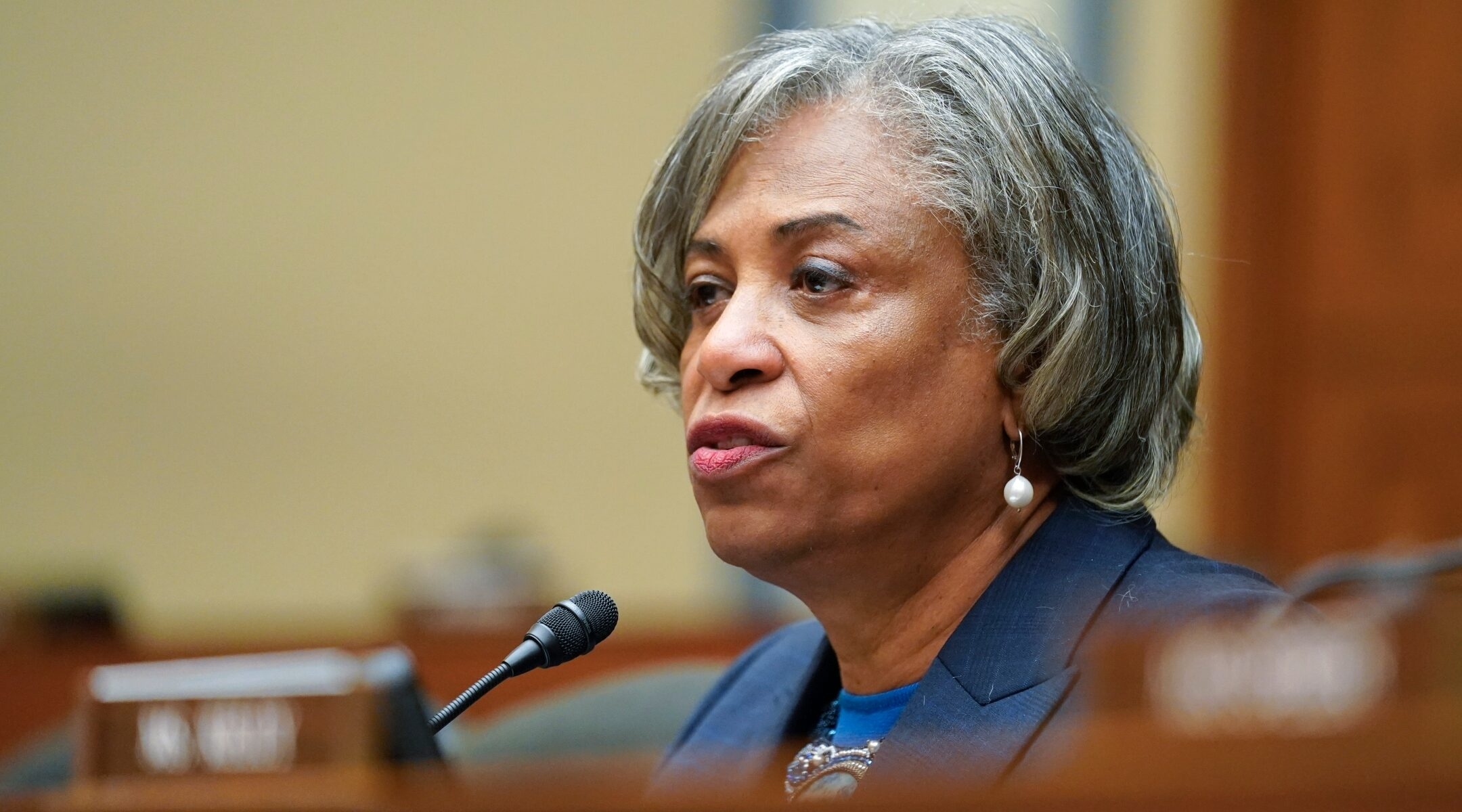WASHINGTON (JTA) — As she nears her retirement from Congress, Brenda Lawrence knows her work bringing Jews and Blacks together is not finished. Her latest reminder: Kanye West.
When Lawrence, a Detroit area Democrat, spoke last Wednesday via Zoom from a glass-enclosed porch at her home overlooking a farm, she wanted to focus on the accomplishments of the Congressional Caucus on Black Jewish Relations, which she launched in 2019. But West’s threat to go “death con 3 on Jewish people” was still fresh.
“I’m not afraid to stand up and tell Kanye West, who is a huge influencer in America, ‘what you’re doing is wrong,” she said, anger creeping into her voice. “And mental illness is not an excuse for racism for misinformation that stokes and encourages those who have this hate [to say] ‘Yes, I can do this,’ and there’s no consequences and keep ratcheting it up.”
The 64-member caucus has focused on establishing a bipartisan baseline of what is antisemitic or racist, setting down red lines at a time of increasing polarization — but there is currently only one Republican: Lee Zeldin of New York, who is running for governor and about to leave Congress either way. Lawrence, who is Black, is retiring because her district was subsumed by another one this year.
“We have as a caucus stood up and said ‘We see what we’re doing we’re calling you out and hopefully we’ll confront you to the point where you will recognize what you’re doing is wrong,’” Lawrence said.
In addition to the antisemitism she has confronted throughout her tenure, another disappointment, she said, has been the reluctance of her Republican colleagues to call out anti-Black racism.
“They just put their head down because they’re so committed to a Republican agenda,” she said. “They are not willing to stand up and call a colleague out if their rhetoric is one that promotes racism or antisemitic behavior.”
A review of statements from the caucus suggests that it has only substantially addressed antisemitism, and its most egregious expressions — the hostage-taking at a synagogue in Colleyville, Texas this year; the stabbing attack at a Hanukkah celebration in Monsey, New York, in 2019; and the anniversary of the 2018 massacre of Jewish worshippers in Pittsburgh.
When the group has made references to anti-Black racism, the caucus talks about it as if it were a thing of the past — in commemoration of the 1960s civil rights cooperation between Jews and Blacks at an opening session in 2019, or in a celebration of Juneteenth, the holiday marking the end of slavery.
Lawrence described with frustration her attempts to get Republicans to talk more about anti-Black racism. She recalled that one Black Republican she would not name said, “Look at me, I’m a Black and I made it,” and how conversations with other Republicans devolved into calls on Democrats to condemn Antifa, the loose-knit network of far-left protesters, or the Black Lives Matter movement.
She credited Zeldin, who is close to former President Donald Trump and some of Trump’s far-right supporters, with being willing to engage with her, although she suggested he was more focused on anti-Jewish bigotry.
“There’s some times Lee Zeldin and I, we have some conversations, you know, he’s willing to call out antisemitic behavior,” she said. “But we have to really work with him” to condemn anti-Black racism.
“But to Lee’s credit, I mean, he’ll have that conversation. And he’s pushed back on some issues that I needed to understand,” she added.
Lawrence said she launched the caucus after chatting on the House floor with John Lewis, the late congressman from Georgia and civil rights icon. She asked him why he never expanded his annual dinner for Jewish and Black House members into a formal caucus.
“And John Lewis said, ‘No, there’s never been a Black Jewish Caucus, but there should be one,’” she said.
She asked Rep. Debbie Wasserman Schultz, a Florida Democrat, to help her establish the caucus and also consulted with Jewish organizations. The caucus was launched in June of 2019 at the annual conference of the American Jewish Committee. It included Lawrence, Wasserman Schultz, Lewis, and Republicans Zeldin, who is Jewish, and Will Hurd of Texas, who is Black.
Despite having no significant tangible lawmaking victories of its own, the group’s real work has been done in a number of forums they co-led in person and virtually, with grassroots members of both communities, Lawrence and Wasserman Schultz said. Lawrence argued the caucus was instrumental in shepherding through legislation expanding funding for prosecuting hate crimes.
“Racism and antisemitism are both increasing,” Wasserman Schultz, who with Lawrence’s and Zeldin’s departures will remain the only chair of the caucus, said in an interview. “We’ve had a good relationship that we can build on within this caucus, and it’s really both a blessing that we can come together and heartbreaking that we even need to.”
Lawrence said she was ready to confront anti-Jewish bias on her side of the aisle, describing conversations she had with Rep. Rashida Tlaib, a fellow Michigan Democrat whose criticisms of Israel some Jewish organizations and a number of Jewish Democrats have said cross into antisemitism.
“I get her pain because of her grandmother and where she lives,” Lawrence said of Tlaib, who is a Palestinian American whose grandmother lives in the West Bank. But Lawrence is rankled by what she sees as Tlaib’s blanket accusations against Israelis, likening them to Trump’s generalizations about Blacks.
“I never would forget when Donald Trump stood up and said, ‘Come on Black people, what do you have to lose?’” she said, referring to Trump’s appeals for Black votes. “So my goodness, that’s how he sees us — broke, uneducated and unemployed. He doesn’t see the brilliance, he doesn’t see the contributions and other things that the Black community has given.
“And it’s just like, I tell Rashida, ‘There’s some bad people who are Black, there’s some bad people who are Jewish, there’s some bad people who are white, there’s some bad people who are Arab. But there’s good people out there, and it’s our job to nurture and water and just push the good that’s in all of us.’”
Now, without Zeldin or Hurd — who left Congress in the last cycle, partly because of his disgust with Trump — the caucus is about to be composed entirely of Democrats. Lawrence says she hasn’t been able to bring in any other Republicans to keep the caucus going beyond her departure.
“We have replaced Democrats, but we’re having a hard time” replacing Republicans, she said. “It is just really frustrating.”
In a statement to the Jewish Telegraphic Agency, Zeldin said it was key for Republicans to sign on. He also praised Lawrence for growing the caucus.
“Congresswoman Lawrence has been a pleasure to work with throughout this effort and she has greatly helped the caucus grow in both membership and influence,” he said. “It’s my sincere hope that in the next Congress, more members on both sides of the aisle will join and be active participants in the caucus’ efforts to build on the unique relationship between the Black and Jewish communities in the U.S.”
Lawrence said she remains hopeful. She recently attended a commemoration of the 1921 mass killing of Blacks in Tulsa, Oklahoma, and was met with “a whole team of young Jewish attorneys” who support racial reparations and were, in her words, “representing the descendants of those who lost their lives and their businesses during [the] Black Wall Street” massacre. The lesson for both communities was in finding triumph, not in being victims, she said.
“We’re not defined by slavery, and we’re not defined by the Holocaust. But we are defined by our perseverance, our survival and compassion to forgive,” she said. “We are defined by our ability to keep the scars as a way to identify how amazing we are, but also to teach compassion and to teach our history so we will never, never ever forget.”
JTA has documented Jewish history in real-time for over a century. Keep our journalism strong by joining us in supporting independent, award-winning reporting.






